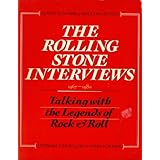
Average Reviews:

(More customer reviews)Although I admit, I am not a Rolling Stone kind of guy, I nevertheless have respected the Rolling Stone Interviews (and interviewers) over the years the same as I still respect the legendary Playboy interviews. This was the first time I had ever read a collection of interviews by Rolling Stone, and I must say that using the Playboy Interviews as a yardstick, I was very disappointed in them. I think the reason I was disappointed is that I expected a lot more.
It is a truism deserving respect these days, that Artists in our culture may be the last of a dying breed of freethinkers. They may be all that remains of those whose minds have not yet been completely "socially adjusted" (i.e. lobotomized into Americanized consensus herd-think). So, naturally I was expecting some freewheeling exchanges here that would take the reader beyond the "beaten path." However, this was not to be the case. Even from the iconoclast Bob Dylan, the interviews here were kept close to the already well-known script. Issues such as how one artist feels about another one, whether they were on drugs or not, their next venues, what they think of their older music, etc, dominated these interviews and seemed to me are the kind of questions that would have been more appropriate for lesser magazines. Said another way, this collection was entirely too "chatty" and superficial for my taste. Instead of engaging in either the intricacies of the music, or into more philosophical issues about the art itself or even about what things affect the artists lives outside of music, it hewed close to inane issues more suitable for "People" magazine than for one with Rolling Stone's reputation.
It unnecessarily made those interviewed seem one-dimensional and shallow. And while this may indeed be the case for the run-of-the-mill pop music star, the collection here, for the most part, was intended to represent the trailblazers and the cream of the crop, and as a result, I expected the interviewer to get beneath the surface to help us understand from whence their creativity springs? But here the reader learns very little that he could have gleaned from lesser-known pop rag sheets. Two stars
Click Here to see more reviews about: The Rolling Stone Interviews, 1967-1980: Talking with the Legends of Rock & Roll

0 comments:
Post a Comment